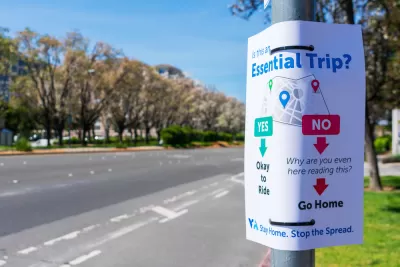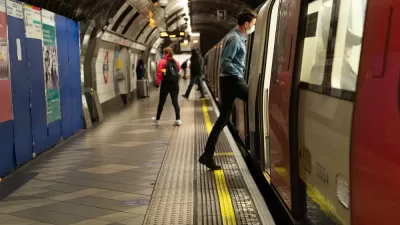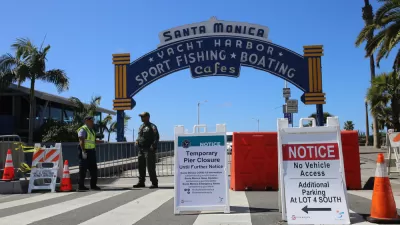Ridership is the wrong way to think about the importance of public transit.

Workers keeping the nation's essential industries and services going are still using transit, but there isn't much good news or positive thinking regarding public transit during the COVID-19 pandemic.
Transit ridership is in free-fall, plunging transit agencies all over the country into an unprecedented fiscal crisis. The CARES Act federal stimulus offered some relief for the fiscal situation facing transit agencies, but the long-term prognosis is completely uncertain. In New York City, the coronavirus has had tragic consequences for transit operators.
This tweet by Richard Florida sums up what most people are probably assuming about the prospects of maintaining public support for transit during and after the pandemic.
People will be scared of subways, busses & trains for some time, with implications beyond transit systems.
They will turn to cars, congestion will increase.
Wonderful transit-connected suburbs may suffer.
Demand for close-in walkable, bikeable neighborhoods will grow. https://t.co/sPJrly2qP7— Richard Florida (@Richard_Florida) April 9, 2020
So, what can be said in defense of the operation and use of public transit in a public health crisis like the COVID-19 pandemic? According to Jarret Walker, a transit planning consultant involved in some of the most innovative bus redesign projects in the United States during the past decade, transit is not just essential in these uncertain times, it's more important than ever.
"The goal of transit, right now, is neither competing for riders nor providing a social service for those in need. It is helping prevent the collapse of civilization," writes Walker for CityLab.
The catch, according to Walker, is that public transit has always been playing that critical role.
Those “essential service” workers, who are overwhelmingly low-income, have always been there, moving around quietly in our transit systems, keeping our cities functioning. Too often, we have patronized them by calling them needy or dependent when in fact everything would collapse if they couldn’t get to work.
Walker's purpose in writing this article is not to look at the crisis with rose-colored glasses, or diminish assessments of the long road back to recovery for transit agencies. Walker doesn't even suggest that sentiments like those expressed above by Richard Florida are wrong. Walker does suggest its time for everyone, first and foremost journalists, to reframe the discussion away from questions about ridership, and toward a better understanding of the essential service provided by transit agencies.
FULL STORY: In a Pandemic, We're All 'Transit Dependent'

Planetizen Federal Action Tracker
A weekly monitor of how Trump’s orders and actions are impacting planners and planning in America.

Map: Where Senate Republicans Want to Sell Your Public Lands
For public land advocates, the Senate Republicans’ proposal to sell millions of acres of public land in the West is “the biggest fight of their careers.”

Restaurant Patios Were a Pandemic Win — Why Were They so Hard to Keep?
Social distancing requirements and changes in travel patterns prompted cities to pilot new uses for street and sidewalk space. Then it got complicated.

Platform Pilsner: Vancouver Transit Agency Releases... a Beer?
TransLink will receive a portion of every sale of the four-pack.

Toronto Weighs Cheaper Transit, Parking Hikes for Major Events
Special event rates would take effect during large festivals, sports games and concerts to ‘discourage driving, manage congestion and free up space for transit.”

Berlin to Consider Car-Free Zone Larger Than Manhattan
The area bound by the 22-mile Ringbahn would still allow 12 uses of a private automobile per year per person, and several other exemptions.
Urban Design for Planners 1: Software Tools
This six-course series explores essential urban design concepts using open source software and equips planners with the tools they need to participate fully in the urban design process.
Planning for Universal Design
Learn the tools for implementing Universal Design in planning regulations.
Heyer Gruel & Associates PA
JM Goldson LLC
Custer County Colorado
City of Camden Redevelopment Agency
City of Astoria
Transportation Research & Education Center (TREC) at Portland State University
Camden Redevelopment Agency
City of Claremont
Municipality of Princeton (NJ)




























